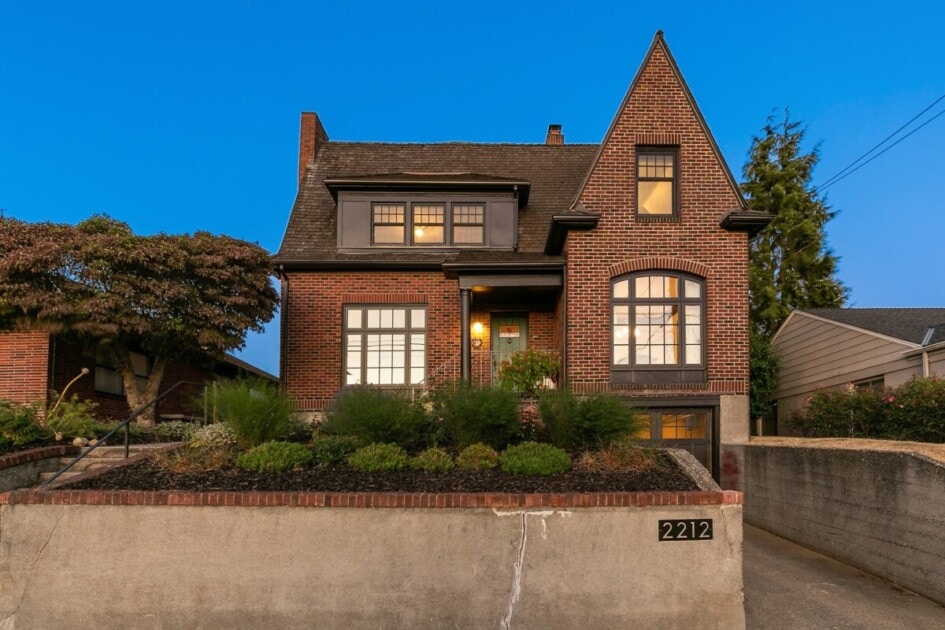In 2020, interest rates took a sharp dive as the Federal Reserve sought to stave off economic collapse amid the pandemic. The resulting low rates sparked a surge in real estate transactions, with numerous homebuyers securing 30-year fixed-rate mortgages below 3%. Fast forward to today, the Fed’s efforts to combat inflation have led to a substantial increase in interest rates, affecting many sectors that influence our economy, including mortgages. These rate adjustments helped propel the 30-year fixed mortgage rate from its lowest recorded point of 2.65% in January 2021 to its current range, currently hovering between 7% and 8%.
(See more about how inflation impacts house prices.)
Fortunately, if our economy shows clear signs of slowing down, there is a possibility the Federal Reserve may cut interest rates in 2024. If you’re a homeowner who locked in at a record-low mortgage rate, refinancing your mortgage now would be an impractical choice. However, recent homebuyers who made their purchase around the peak rates may discover potential advantages in considering a rate and term refinance in 2024. According to experts, refinancing makes sense if you can reduce your current interest rate by at least 0.75 percentage points. While this might sound like a small difference, it can translate into substantial savings over time including lower monthly payments, paying off the mortgage quicker, and even allowing homeowners to tap into their home equity for other expenses.
So, if you’re fairly new to homeownership, perhaps you recently bought a townhouse in Alexandria, VA, or a home in Seattle, WA, with mortgage rates beginning to trend downward, you may soon have truly viable options to refinance your high-interest loan for a lower interest rate, keeping more money in your pocket.

What is a mortgage refinance?
The phrase “refinancing” refers to a mortgage transaction in which your bank or lender pays off your old mortgage in exchange for a new one.
Most borrowers decide to refinance to reduce their interest rate and shorten their repayment period or to benefit from converting part of the equity they have built in their homes into cash.
When is the right time to refinance your mortgage?
In general, refinancing is a smart choice if it will save you money, help build home equity, or help pay off your mortgage quicker. Some common reasons why you might consider refinancing your mortgage are:
- Lowering your interest rate if mortgage rates have recently decreased
- Shortening your loan term to save money in interest
- Switching from an adjustable-rate mortgage (ARM) to a fixed-rate mortgage to avoid rate hikes
- Lowering your interest rate once your credit score increases
- Getting rid of a government-backed loan to lower interest and eliminate mortgage insurance rates
- Tapping into your home’s equity, whether it’s to take out some extra money or get rid of mortgage insurance
Let’s dive into each of these scenarios.
Refinancing to lower your interest rate
You may be able to get a better interest rate if rates recently dropped or your credit score increased. The rule of thumb is to refinance your mortgage when interest rates are at least 1% lower than your current rate. However, this is only sometimes the case. Based on your specific situation, it may be worth it to refinance when interest rates are only 0.5% lower, or it might be better to wait until interest rates are more than 1% lower than your current rate.
Not only does lowering your interest rate enable you to save money, but it also increases the rate at which you build equity in your home and can reduce your monthly mortgage payment.
Example
Let’s say you take out a 30-year, $300,000 mortgage with a fixed rate of 6.2% on a home in Tampa, FL, your monthly interest, and principal payment will be $1,812. But let’s say you get a lower interest rate at 5.2%. Your new monthly payment will be reduced to only $1,660, which means you’ll save $152 per month, equalling $1,824 per year and $54,720 over 30 years. Depending on your financial situation and how much it costs to refinance, those savings may or may not make it worth it for you to refinance. A mortgage calculator is a helpful resource for budgeting some of the costs.
Make sure to keep an eye on current mortgage rates when you’re thinking about refinancing.
Refinancing to shorten the term of your home loan
When you refinance for a shorter term length, such as going from a 30 year loan to a 15 year loan, you’ll usually end up paying more every month. For instance, if you start with a 30-year, $100,000 mortgage at a rate of 6.2%, you can expect to pay around $612 per month, and a total of $220,320 over 30 years. If you shorten your loan term to 15 years, your mortgage payment would increase to $855 per month, which sounds like a big jump. However, you’ll end up paying only $153,900 over the course of the loan, saving you $66,420.
So, while a 30-year mortgage may offer a reduced monthly payment, you will pay more in interest over the life of the loan. Though not everyone can afford the price jump in monthly payments of a 15-year loan, but if you can, then expect to save a significant amount of money in mortgage interest payments.
Refinancing to a fixed-rate loan vs. an adjustable-rate mortgage
A fixed-rate mortgage is a loan with a fixed interest rate for the duration of the loan, regardless of whether rates rise or fall. In contrast, an adjustable-rate mortgage (ARM) can increase or decrease at specific intervals throughout the life of the loan.
Refinancing to a fixed-rate mortgage from an adjustable-rate mortgage is common and can save you money in the long run. An ARM may initially have lower rates than a fixed-rate mortgage. However, adjustments can result in higher rates down the road. For example, you might be interested in converting to a fixed-rate mortgage if your ARM’s interest rate rises to 6.5%, when fixed-rate mortgages are just 5.5%. Switching to a fixed-rate loan results in a lower interest rate and eliminates concern over future interest rate hikes.
However, switching from a fixed-rate loan to an adjustable-rate mortgage, which frequently has a lower monthly payment in the first few years of the loan than a fixed-term mortgage, can be a wise financial move if interest rates are falling. This scenario is particularly effective for homeowners who do not plan to stay in their homes for more than a few years. But you’d also want to make sure that your monthly cost savings would eventually offset the cost to refinance the loan.

Refinancing when your credit score increases
Another great time to refinance your mortgage is when your credit score increases, which may allow you to get a lower interest rate on your mortgage. Why? A mortgage is a type of debt, and lenders check your credit score to determine how reliable you are as a borrower to repay that debt. If you currently have a higher interest rate, lenders may offer you a lower interest rate because a higher credit score tells them that they are taking on less risk when lending you money. So if you’ve managed to pay off your high-interest credit card debt, and you’ve seen a good bump in your credit score, now may be an excellent time to refinance.
(See what the four Cs of credit are and how to improve your score)
Refinancing to switch loan types
You can also refinance your mortgage to get rid of loans backed by the Federal Housing Administration (FHA), Veterans Affairs (VA), or United States Department of Agriculture (USDA) too. While these loans are helpful for many people, they often come with higher interest and mortgage insurance rates. So if you’ve recently increased your credit score and grown equity in your home, it might be a good choice to refinance to a conventional mortgage for possibly a better interest rate.
Refinancing to tap into your home’s equity
You most likely have equity in your property if you’ve been making mortgage payments. Typically, the longer you’ve lived in your home, the more equity you have. Home equity is the amount of your home that you actually own, or the difference between what your home is worth and what you owe your lender. As you pay off your mortgage, you lower your principal, or the outstanding loan balance, and you build equity over time.
A cash-out refinance allows you to take out more money than you owe on your home. For instance, if you have $300,000 left to pay on your home and do a cash-out refinance for $350,000, you’ll receive the extra $50,000 in cash and pay it off with your mortgage. This is typically done to consolidate debt, make a large purchase, improve your home, and more. But it’s crucial to weigh the pros and cons beforehand, since you’ll be paying off your first loan with another loan with different terms.
Refinancing to access your home’s equity can also help by removing mortgage insurance premiums. For example, if you made a down payment of less than 20% on your home, you probably have to pay a yearly mortgage insurance premium. But, if you’ve now paid off at least 20% of your home’s value, refinancing can help you shake off the mortgage insurance. However, if you get your bank to appraise your home and the value comes in at 20% or higher, the PMI can also be dropped without refinancing. This may be a viable options since homes typically grow in value over time.
How much does it cost to refinance your mortgage?
While there are many great reasons to refinance your mortgage, it can be surprisingly expensive. Below are the average costs when you refinance your mortgage.
| Item | Average Cost | What You Need to Know |
|---|---|---|
| Appraisal | $300-650 | An appraisal determines the current value of your house so that your lender can decide on the mortgage amount. |
| Closing costs | 2-6% of the loan’s value | Closing costs usually include an appraisal, attorney fees, a credit check, origination fees, title search, and other costs associated with taking out a new loan. |
| Credit check | $10-60 | Credit bureaus such as Equifax, Experian, and TransUnion offer credit checks, as well as third-party businesses. |
| Mortgage insurance | 0.58-1.86% of the loan amount per year | Usually, if you have paid off less than 20% of your home’s value, you will have to pay mortgage insurance. |
| Origination fees | 0-1% of the loan amount | An origination fee is a fee that lenders charge customers to take out a loan. Origination fees vary depending on the lender you use and the loan you take out. |
| Prepayment penalty | Varies | You may have to pay a fee for paying off your previous mortgage early. Lenders charge prepayment penalties to incentivize borrowers to pay off their loan slowly over time, so the lender can collect more interest. Read the terms and conditions or contact your lender to determine if this applies to you. |
| Title search | Up to $250 | Mortgage lenders require a title search when you refinance, similar to when you buy a new home. |
Things to consider before refinancing your mortgage
Before signing the new loan, here are a few questions to consider:
Can I afford to refinance?
To start, you should evaluate your current financial situation, your long- and short-term financial goals, and the cost of refinancing your mortgage. Refinancing generally costs 2-6% of the loan amount in closing costs, so things can add up quickly. It’s essential to calculate how long it will take for monthly savings to recoup these costs, often called the break-even point.
What is my break-even point?
As mentioned earlier, your break-even point is when you will recoup all the closing costs that come with refinancing your loan. For example, assuming the lender and title fees are $5,000 and your monthly savings from refinancing is $200 per month.
| Closing Costs | $5,000 |
| Monthly Savings | $200 |
| Breakeven | 25 months ($5,000/$200 = 25 months) |
In general, staying in your current house is best until you reach your break-even point to make sure that refinancing is worth it.
How much longer do I plan to live in my current home?
When you’re refinancing your mortgage, one of the first things to consider is how much longer you want to stay in your home. Think about whether your current home will fit your lifestyle in the future. If you’re close to starting a family or having an empty nest, and you refinance now, there’s a chance you will only stay in your home for a short time to break even on the costs.
Similarly, if you’re close to paying off your current mortgage, refinancing may not be worth it, either.

Will I have to pay a prepayment penalty?
Prepayment penalties are different depending on your lender. Some lenders charge a flat fee, while others charge a percentage of your loan amount. Read the terms and conditions for your loan, or contact your lender to find out if you have a prepayment penalty and how much it costs.
What is my credit score?
If you recently took out another loan or made a late payment, your credit score may have gone down, which means it may not be the best time to refinance. Generally, the higher your credit score, the lower your interest. Most lenders require that borrowers have a minimum credit score of 620-670. Before you refinance, ensure your credit score has increased or stayed the same, and that you meet your lender’s minimum requirements.
When should you refinance your home? Final thoughts
Deciding when to refinance your mortgage is complicated and depends on your unique situation. Common reasons to refinance include getting a lower interest rate, shortening your loan’s terms, switching to a fixed-rate or adjustable-rate mortgage, and tapping your home’s equity. Removing mortgage insurance or loans backed by the FHA, USDA, or VA are other common reasons to refinance.
Wherever you’re at, do the math and work with a trusted mortgage lender to make sure that refinancing makes sense for you.


